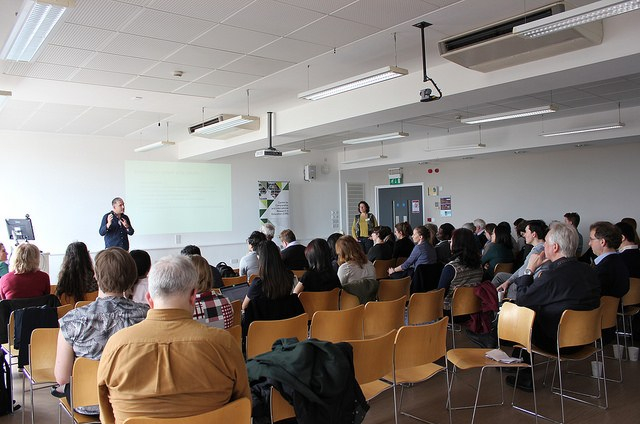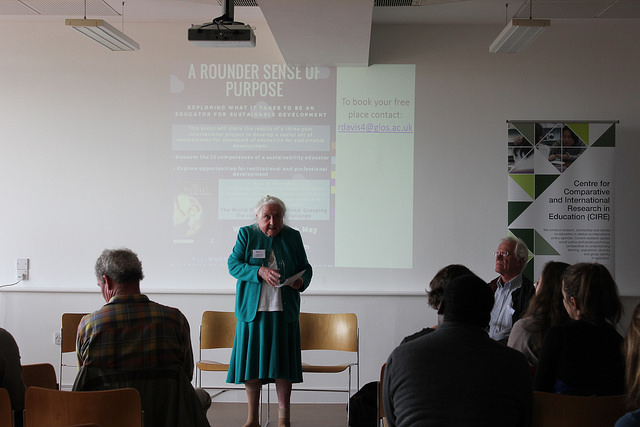CIRE recently celebrated the launch of the book Long Way from Adi Ghehad: Journey of an Asylum Seeker: Dr Teame Mebrahtu written by Stan Hazell. The book focuses on the life and work of Dr Teame Mehbratu, whose career as a member of staff and later, Advisor to International Students and faculty member, had a profound impact on the Graduate School of Education in his research, teaching, and counselling career. He kindly sat for an interview in July 2017 to discuss some aspects of the book and his research and teaching career.

Dr Mebrahtu (centre) at the launch. Also pictured (from left) Dave Brockington, Dr Roger White, Teblez Mebrahtu, Dr Teame Mebrahtu, Prof. Michael Crossley, Anne Crossley, and Prof. Malcolm Johnson.
CIRE Blog: The book details your life’s journey from Eritrea to Bristol. How did your early years influence the direction of your academic life?
TM: When I started school at the age of seven, formal schooling, even at the elementary level (grade 1 to 4), was not compulsory. Now, more than six decades later, formal education still remains a privilege rather than a right for many school-aged children in Eritrea.
As the eldest child in my family, going to school was a great joy and privilege for me. Mastering the 3R’s gave me the opportunity to read the weekly newspaper of the time and a few basic Tigrinya books that my father bought for me. This in turn opened new opportunities for me to broaden my understanding of countries and situations outside of my own and enriched my desire for general knowledge. It also made me more competitive in my studies; I was always among the top ten of students throughout my academic career. Moreover, for reasons which I still do not understand, I have always been either appointed by teachers or elected by my classmates to be a class monitor. Thus, it is fair to conclude that my early appetite for learning, my competitiveness, and my sense of responsibility as a trusted class representative helped to shape the trajectory of my life and later career.
Another experience which greatly affected the direction of my future academic life was the interruption of my senior secondary education due to student strikes. These strikes, which led to the arrest of many students including myself, were fuelled by the creation of a dysfunctional federation between Eritrea which was then a “Democracy” and Ethiopia, then an “Autocracy”.
What advice would you give to early career researchers and PhD students interested in issues of immigrant communities, refugees, and migrants in the UK?
Broadly speaking, I would like PhD students interested in issues of immigrant communities, refugees, and migrants in the UK to take heed of the following four observations. First, knowing some members of immigrant communities in one’s home town is not a sufficient condition for writing a dissertation on them. One needs to go further to broaden and deepen his/her understanding of what the “push and pull” factors behind their migration were and, equally importantly, how these groups or peoples lived, thought and worked, by walking in their own moccasins. Second, there is the need to realise that “migration” is as old as humanity itself and that it is not necessarily negative, as tends to be portrayed by the media in the Global North. Third, there is a need to undertake extensive research into all aspects of education and well-being of migrants and refugee communities, as well as their offspring, in the UK. Such a comprehensive study needs to be quantitative and qualitative in nature as well as multi-dimensional in its orientation.
Finally, PhD students need to be aware of the danger of compartmentalisation of study areas. These days, we have too many specialised areas that do not necessarily communicate with each other. This begs for “pruning”, which in itself presupposes intimate understanding of the boundaries and the interface between say, Global Education, Refugee Studies, Migration Studies, and Intercultural Education, to mention but a few.
What would you describe as your most significant or valued accomplishments during your time at the University of Bristol?
This is a complex question which requires detailed treatment of the relevance of the book. It is also worth-noting that it would be presumptive of me to pinpoint what my accomplishments are or might be. Instead, what I prefer to do is share with the reader some of the experiences I enjoyed which I believe had some impact on my performance as a Bristol University educator.
One of these is getting the opportunity and the experience of caring for all the national and international postgraduate students under my charge. This manifested itself in treating them with the respect they deserve but also in taking action to meet their respective needs in as much as possible. For instance, allowing my office to be used as a prayer room by my Muslim students in the fasting month of Ramadan and also convincing the University authorities of the need to build feet washing basins for them in order to perform their “salat” – the prayers that fell in the time between lectures. This theme reinforced by my ability to first learn and then teach others how to learn “to live with a difference”, is discussed fully in the book chapter on “The Role of an Advisor to International Students”. Briefly, the theme implies the need to learn how to live unselfishly and how to serve others by being there for them when they needed you most.
A second area of accomplishment which was widely spoken about by both teachers and academics within Bristol was the project I ran on promoting international understanding through education. The primary aim of this Rowntree-sponsored project was to tackle certain intended and unintended biases held by the pupils in 100 Avon and Somerset schools about the developing world in general and Africa in particular. This project, among others, entailed discussing their pre-conceptions with them and encouraging them to create contacts and exchange of ideas between them and some refugee pupils in schools in Sudan.
A third area which gave me great satisfaction whilst serving the University was the immense effort and sacrifice I made to build bridges between my alma mater in my second home, the UK, and the Ministry of Education in my country of birth, Eritrea. The Bristol-Eritrea Link Programme which was sponsored by the Danish Organisation DANIDA, resulted in the production of 1 PhD and 48 M.Ed. degree-holding Eritreans on-site in Bristol and in the professional upgrading of 250 School Directors, Supervisors and District Education Officers over a period of three, in-service summers in Eritrea. Designing these tailor-made inservice modules and teaching and running them in Asmara were by no means easy tasks. The professional and financial benefits of this Link Programme, which lasted for about a decade, were also of immense significance to the University of Bristol. Another area of activity recognised by many national and international educators as an accomplishment were the four International Conferences I organised on topical professional issues.
Finally, what would you like the audience to take away from reading about your life and work?
It is not for me to suggest what readers would take away from reading about my life and work. This is because the book blends aspects of culture, religion, history, politics, economics and education (which in turn is broken down to multicultural, refugee, and global education) whilst narrating my life journey. Of these, different readers may find some aspects more relevant to their needs and interests than others. Broadly, the book demonstrates how the lives of individuals are or can be affected when they move from the local to the national and global spheres of life. It also provides a vision of hope and action for the future of humanity. Given this, I would like to invite readers to reflect more on the following five concepts and practices.
The first pertains to my “global vision”. In the book, I am described as a “global educator” and a “dreamer”. My dream is to see a world where justice, fairness, and equality prevail for all members of the Human race. A related dream is to see a “reconciled world” – one where the powerful and technologically-advanced “North” is reconciled with its weaker, poorer, and more populated counterpart, the “South”. A third area worth reflecting upon is my conviction in the power of education and its key roles in individual, social, national, and global developments. Such a conviction (one that has earned me the nickname of an “Education Evangelist”), I believe, will help all educators to make a difference in a world of indifference. A fourth is my suggestion that we can use education to achieve peace at individual, national, and global levels. This perspective of cultivating peace in people’s hearts and minds through education is in direct contrast to the old Roman maxim which argues that the way to peace is “through war”. Finally, I would like readers to reflect on my perception that life becomes more meaningful when one leads a life of purpose. This is best understood when each one of us decides to become more connected with humanity through our thoughts and actions, one of which could be lifting others as we climb up.
The book can be found online and will soon be featured in the University of Bristol library.






 On Thursday 2 March, CIRE members enjoyed a talk by Dr Audrey Reeves from the School of Sociology, Politics and International Studies (SPAIS) here at Bristol. Audrey shared with us her recent doctoral research exploring the politics of affect in the context of education for peace and conflict at the Pearl Harbor museums and memorials. Through a visual journey around the Pearl Harbor site, we were introduced to the increasing link between war museums and the wider tourism industry and consumerism. In particular, Audrey honed in on the idea of affect referring to the response of our bodies to stimuli, prior to any conscious or subjective reaction; emotion is a more conscious reaction that we display and can be put into words. Through the careful design of visitor sites, affect is therefore promoted in order to encourage or repress consumption. The Contemplation Circle at Pearl Harbor looks out across the water and contain the names of all Americans who died in the 1941 attack. The design reinforces the belief that this was a grievable event, with presumably innocent lives lost in an illegitimate attack at home from a foreign place (Japan) and dictates a quiet, sombre response. On the other hand, other areas are colourful and fun in design, reinforcing the idea of just wars, American force and protection; being uplifted means that people are more likely to buy. Audrey’s research encompassed museums in Germany, Israel and the UK as well as the USA, all of which demonstrate this principle.
On Thursday 2 March, CIRE members enjoyed a talk by Dr Audrey Reeves from the School of Sociology, Politics and International Studies (SPAIS) here at Bristol. Audrey shared with us her recent doctoral research exploring the politics of affect in the context of education for peace and conflict at the Pearl Harbor museums and memorials. Through a visual journey around the Pearl Harbor site, we were introduced to the increasing link between war museums and the wider tourism industry and consumerism. In particular, Audrey honed in on the idea of affect referring to the response of our bodies to stimuli, prior to any conscious or subjective reaction; emotion is a more conscious reaction that we display and can be put into words. Through the careful design of visitor sites, affect is therefore promoted in order to encourage or repress consumption. The Contemplation Circle at Pearl Harbor looks out across the water and contain the names of all Americans who died in the 1941 attack. The design reinforces the belief that this was a grievable event, with presumably innocent lives lost in an illegitimate attack at home from a foreign place (Japan) and dictates a quiet, sombre response. On the other hand, other areas are colourful and fun in design, reinforcing the idea of just wars, American force and protection; being uplifted means that people are more likely to buy. Audrey’s research encompassed museums in Germany, Israel and the UK as well as the USA, all of which demonstrate this principle.![IMG_0451[1]](https://cireblog.files.wordpress.com/2016/07/img_04511.jpg?w=440&h=330)
![IMG_0447[1]](https://cireblog.files.wordpress.com/2016/07/img_04471.jpg?w=440&h=330)